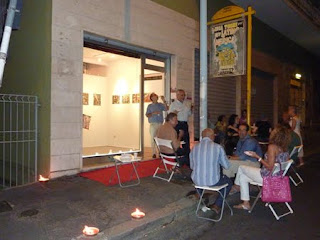
 In August, studio.ra gallery hosted the Puki Parade, a participatory performance event, based on paintings by the American artist Reynolds.
In August, studio.ra gallery hosted the Puki Parade, a participatory performance event, based on paintings by the American artist Reynolds.Pukis subvert masterpiece paintings by inserting the “Puki” (which means vagina in Filipino) into the image, along with many other personalized narratives. The resulting transformations convey an articulation of female power- in this case “Pacifista” power rather than the imperial power of the paterfamilias. studio.ra exhibited thirteen “Pukis”, which are small watercolors, which can fit in carry on luggage.

Power Puki
“Power Puki” is based on a painting by Gustave Moreau, while
and
are both based on paintings by Durer. Puki paintings have been made into banners for participants to display in the Parade. Subsequently, the banners were exhibited in the gallery, along with the paintings.
The paintings have the jewel like detail and the feel of icons. Many turn familiar portrayals of the Madonna into the Pagan Goddess.
MOMdonna of the Rocks
“MOMdonna of the Rocks.” Others, not based on specific masterpieces, still depict sacred scenes of female power.
Magnificat MOMsters
"Magnificat MOMsters" Here as Mary meets Elizabeth, she proclaims: “Behold: Future Generations Will Call Me Blessed!” Still others display fantastic scenes of Pukis at play
Fruity Tooty Puki
"Fruity Tooty Puki" or
Majolica MOMster
“Majolica MOMster”, which is based on Majolica plate in a museum in Liverpool, England, the site of two previous Puki parades. As most religious paintings were regarded not only as objects of veneration but as displays of state power, or as private instruction in Church propaganda, Pukis enfold the past in constructing art to address feminist concerns of the present. As the church separated from the state, paintings were used to convey Allegories of conquest. The insertion of the Puki into these Allegories displays hidden histories and disputes dominant assertions of power as well as stereotypes of passive and compliant women.
Noire Nookie
Allegorical European Puki
Pukis, freed of constraints, can represent gay princesses “Allegorical European Puki”,
Allegorical African Puki
Proud Queens, "Allegorical African Puki",
Allegorical American Puki
Indigenous Goddesses "Allegorical American Puki"
Allegorical Asian Puki
and Sultry Sultanas "Allegorical Asian Puki".
The Puki Parade has traveled through seventeen different locations in England, The United States, Chile, Brazil, Paris, and Berlin. Raffaella Losapio, the Gallery Director of studio.ra was assiduous in charting out a route and in obtaining permission from the authorities after an unfortunate incident in Paris.
According to Parisian police, one can only have revolutionary manifestations in the streets, not the gardens.
Yet Pukis love private places and protest phallic monumentality, and feel most at home bucolic settings.
Accordingly Raffaella arranged a route from the Gallery
through the streets of Rome, to Il Parco Della Caffarella. The Parco featured not only numerous archeological features from ancient Rome but also offered numerous examples of ancient farming practices, which still are in use today.
Pukis, who love conservation values, felt right at home among the beauteous Italian landscape.
Since the Puki parade derives its name from the Philippines, the fact that a structure exactly like the Filipino Nipa Hut
was in the park only added to the sense of commune with ancient pastoral practice. Pukis are pagan, not pure!
On the auspicious day of the Parade, first the participants gather for their costuming. The artist has her own vestal garments,
but as the Puki Procession is participatory, people are free to choose their own variations. Masks and face painting are provided,
but many participants bring their costuming, reflecting their own cultural identity.
Personalized narratives of the Puki are encouraged by the artist…here we see Isabelle as a Classical Pagan Goddess.
the artist had no problem finding participants, even though many cult members of previous Parades were unable to make it to Rome. Some of the previous parades are feature on YouTube The Puki Procession
La Pucelle Puki and most recently Antiquarian Puki Prayers. Finally, the ritual costuming was done, and participants assembled in the gallery for photo ops.
Pukis parade past the paintings
as "stations” of worship. A teapot is on hand to bless the blood of the Puki.
Other props have included decorative umbrellas
and Tibetan prayer bowels.
The Procession wended its way through the streets
to the Park
to the mystical sounds of parrots and crickets, past the descendants of the sheep dogs,
their charges,
their watering trough
and culminating at the NYMPHAEUM OF AEGERIA,
a beautiful grotto.
After a communion at the grotto, Participants blessed the sunset.
Puki paraders included:
and special honors go to a Roman artist
Maddalena Marinelli
Isabella Moroni
Raffaella Losapio
Raffaella, studio.ra Gallery Director and Publisher of art a part of cult(ure), and of course, Reynolds.
Reynolds
Afterwards, celebrants gathered at the Gallery for a Puki party.
A Fellini feeling was in the air as Reynolds relaxed in her new ball gown.
Festive food and drink were handy.
The puki parade is an ongoing artistic project, which evolves as it grows. Paintings have honored favorite Italian artists “Milky Way MOMster” (after Tintoretto’s “Orgin of the Milky Way”)-featuring the Roman Goddess Juno.
Milky Way MOMster
Many future paintings were conceived while admiring the ancient artifacts of Rome amidst their natural surroundings.
Here is a future Puki
with her favorite botanicals.
Her last day in Rome, the artist found Peace in an ancient Goddess temple,
which will be anointed by the blood of the puki, as Pukis are NOT Pure even if they are Pagan! Pukis salute Rome!!!!!





















































